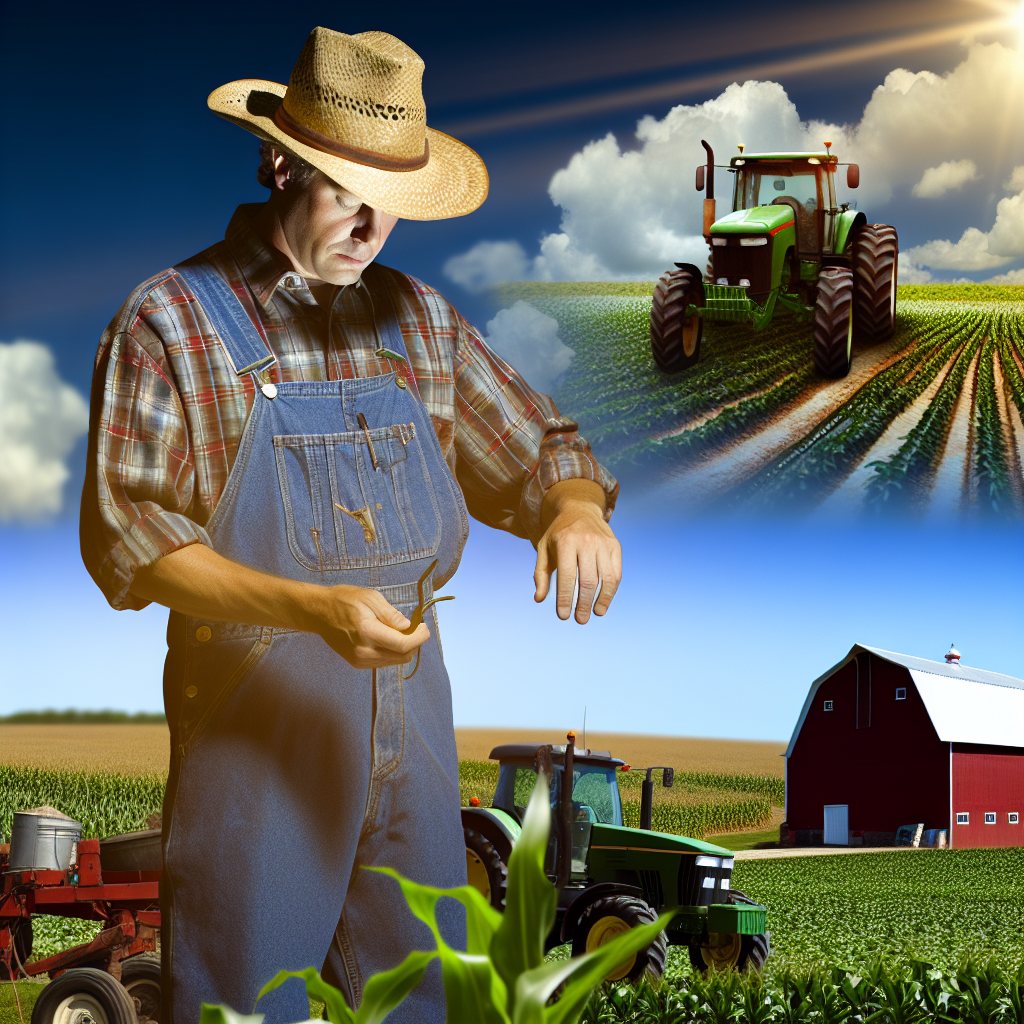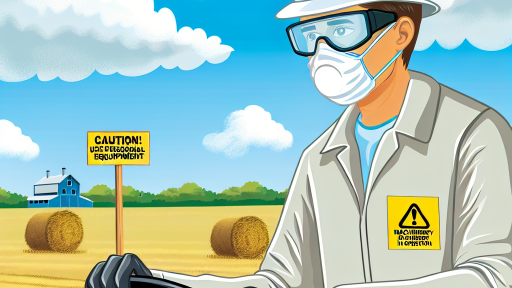Introduction to Trade Policies and Their Importance in Agriculture
Trade policies play a crucial role in shaping agricultural practices.
These policies determine how products move across borders.
They influence the economic landscape for farmers and exporters.
Moreover, trade agreements can affect commodity prices.
Understanding these policies helps farmers strategize effectively.
Types of Trade Policies
Various types of trade policies exist today.
Tariffs are one common form, imposing taxes on imports.
Quotas can limit the volume of specific goods entering a market.
Subsidies support domestic farmers through financial assistance.
Trade agreements often eliminate barriers to encourage exports.
Impact on Local Farmers
Local farmers face both opportunities and challenges from trade policies.
For instance, favorable agreements can open new markets.
On the other hand, increased competition may drive prices down.
Farmers need to remain adaptable to changing policies.
Additionally, trade policies can dictate what farmers choose to grow.
Transform Your Agribusiness
Unlock your farm's potential with expert advice tailored to your needs. Get actionable steps that drive real results.
Get StartedGlobal Market Dynamics
Trade policies also influence global market dynamics significantly.
The interconnectedness of economies can amplify these effects.
For example, changes in U.S. trade policy impact global supply chains.
Farmers must be aware of international trends to succeed.
Moreover, geopolitical factors can create both risks and rewards.
Future Considerations
Looking ahead, trade policies will continue to evolve.
Farmers must stay informed about emerging regulations.
Adopting innovative practices can help mitigate risks.
Building strong networks within the agricultural community is vital.
Ultimately, adapting to trade policy changes promotes resilience.
Overview of Key Trade Policies Impacting Agriculture
Understanding Tariffs
Tariffs impose taxes on imported goods.
They impact the cost of farming inputs and outputs.
Increased tariffs can raise the prices farmers pay for equipment.
They can also affect the prices at which farmers sell their products.
This situation may lead to reduced profit margins for farmers.
Farmers often have to adjust their pricing strategies accordingly.
Generally, higher tariffs can decrease competitiveness in international markets.
Analyzing Quotas
Quotas limit the amount of specific goods that can be imported.
These restrictions help protect domestic farmers from foreign competition.
However, they can lead to supply shortages in the market.
Farmers may experience inflated prices for their goods during these periods.
Quotas can also disrupt agricultural trade relationships.
This complexity can create uncertainty for farming operations.
Effective management of quotas is crucial for thriving farms.
Showcase Your Farming Business
Publish your professional farming services profile on our blog for a one-time fee of $200 and reach a dedicated audience of farmers and agribusiness owners.
Publish Your ProfileExploring Subsidies
Subsidies provide financial assistance to farmers.
They can help stabilize farm income amidst fluctuating markets.
These supports often encourage farmers to grow certain crops.
Consequently, they can influence production decisions nationwide.
Subsidies can also impact international trade dynamics significantly.
While they support farmers, they may distort competition globally.
Successful farming operations often navigate the complexities of subsidies.
How Globalization and Trade Agreements Shape Farming Operations
The Role of Trade Policies
Trade policies significantly impact farming operations on a global scale.
These policies determine which crops can be grown profitably.
Moreover, they affect the pricing and distribution of agricultural products.
Countries negotiate trade agreements to facilitate agricultural exports.
These agreements often include tariffs and quotas that influence market access.
Influences of Globalization
Globalization has transformed how farming operates across countries.
It allows farmers to access international markets more easily.
Additionally, it creates opportunities to import necessary resources.
Farmers benefit from purchasing seeds and equipment from global suppliers.
However, globalization also increases competition among farmers.
Consequently, local producers may struggle against cheaper imports.
The Impact of Free Trade Agreements
Free trade agreements reduce tariffs, making imported goods cheaper.
This often leads to lower prices for consumers but poses challenges for local farmers.
The North American Free Trade Agreement (NAFTA) serves as an example.
NAFTA helped U.S. farmers export more products to Canada and Mexico.
However, it also increased competition from foreign agricultural goods.
Environmental Considerations
Trade policies can also influence sustainable farming practices.
Global demand may push farmers to adopt environmentally harmful methods.
Conversely, trade agreements often include environmental standards.
These standards encourage farming practices that protect ecosystems.
Farmers can benefit from sustainable practices through premium pricing.
Future Trends in Agriculture
The landscape of farming is changing rapidly due to trade policies.
Emerging technologies play a crucial role in this evolution.
Precision agriculture is becoming increasingly popular among farmers.
Such technologies allow for more efficient use of resources.
Moreover, farmers are exploring new crops to meet global demands.
Adapting to these changes will be vital for future success.
Discover More: How Zoning Laws Affect Farm Operations
The Role of Export Policies in Enhancing Agricultural Profitability
Understanding Export Policies
Export policies significantly influence agricultural profitability.
They govern how easily farmers can access international markets.
Effective policies encourage greater agricultural exports.
For instance, they may reduce tariffs on exports.
This reduction makes products more competitive abroad.
Showcase Your Farming Business
Publish your professional farming services profile on our blog for a one-time fee of $200 and reach a dedicated audience of farmers and agribusiness owners.
Publish Your ProfileImpact on Pricing Strategies
Export policies directly affect pricing strategies for farmers.
When tariffs are low, farmers enjoy better prices for their goods.
Higher prices motivate farmers to produce more crops.
This increase in supply can stabilize market prices.
Conversely, high tariffs can lead to decreased prices.
Enhancing Crop Diversity
Export policies can also promote crop diversity.
Farmers may shift to growing high-demand export crops.
As a result, they can maximize potential profit margins.
For example, growers might prioritize organic fruits and vegetables.
This strategic shift helps meet global market needs.
Investment in Technology and Innovation
Favorable export policies encourage investment in technology.
Farmers adopt innovative practices to meet international standards.
This technology helps increase crop yields.
In turn, higher yields contribute to greater profitability.
Additionally, farmers can implement sustainable practices.
Challenges and Opportunities
While export policies offer opportunities, they also present challenges.
Farmers must navigate fluctuating international demand.
Market uncertainties can affect profitability significantly.
However, successful navigation can lead to substantial gains.
Building solid relationships with foreign buyers is essential.
Uncover the Details: Navigating Biotechnology Policies in Farming Practices
Impact of Trade Policies on Domestic Farmers vs. Export Farmers
Understanding Domestic Farmers
Domestic farmers directly depend on local markets for their sales.
Trade policies can significantly affect pricing and market access for these farmers.
For instance, protective tariffs on imports may help domestic farmers compete better.
However, these tariffs can also lead to higher prices for consumers.
Moreover, government subsidies often play a crucial role in supporting domestic operations.
Such subsidies can counterbalance the effects of unfavorable trade policies.
Ultimately, domestic farmers must adapt to evolving trade landscapes.
Challenges for Domestic Farmers
Domestic farmers face various challenges due to trade policies.
Increased competition from imports can diminish their market share.
This situation may force some farmers to lower their prices to remain competitive.
Consequently, profit margins can drastically shrink over time.
Additionally, changing trade agreements can create uncertainty in the market.
These uncertainties can discourage investment in new technologies or services.
Export Farmers and Global Markets
Export farmers aim to sell their products in international markets.
Trade policies greatly influence their access to these markets.
Favorable trade agreements can open up new opportunities for export farmers.
They can benefit from reduced tariffs and improved market access.
In contrast, protectionist policies can limit their competitiveness abroad.
As a result, they may lose significant revenue from foreign sales.
Showcase Your Farming Business
Publish your professional farming services profile on our blog for a one-time fee of $200 and reach a dedicated audience of farmers and agribusiness owners.
Publish Your ProfileOpportunities for Export Farmers
Export farmers can leverage trade deals to expand their operations.
They may find new markets for products that are not in high demand locally.
Furthermore, marketing their goods internationally can enhance brand visibility.
In addition, they may gain access to better pricing structures through economies of scale.
Ultimately, a favorable trade climate can lead to growth and sustainability.
Implications of Trade Policy Effects
Both domestic and export farmers experience unique impacts from trade policies.
Understanding these effects helps farmers strategize effectively.
Adaptability and awareness of changes in trade policy are essential.
By staying informed, farmers can position themselves for success.
See Related Content: Navigating Local Zoning Laws for Farms

Case Studies: Successful Adaptation of Farming Practices to Changing Trade Policies
Overview of the Impact of Trade Policies
Trade policies significantly influence farming operations worldwide.
These policies alter market access for agricultural products.
Consequently, farmers adapt their practices to remain competitive.
Example of Adaptation: Organic Farming in Canada
In Canada, trade agreements boosted organic farming practices.
Farmers shifted towards organic produce to access new markets.
This approach improved their profitability and sustainability.
For instance, Maple Leaf Farms increased their organic crop production.
They collaborated with international retailers, expanding their reach.
Example of Adaptation: Technology Integration in the U.S.
In the U.S., farmers adopted advanced technologies for better compliance.
For example, David and Emily Johnson invested in precision agriculture.
This investment allowed them to optimize resource use effectively.
Their operation became more resilient to trade fluctuations.
As a result, they maintained profitability despite changing tariffs.
Lessons Learned from Global Practices
Farmers worldwide demonstrate resilience in adapting to trade policies.
Utilizing technology and sustainable practices enhances their operations.
Moreover, diversification into niche markets proves beneficial.
It allows farmers to mitigate risks associated with global trade changes.
Continuously monitoring policies ensures farmers stay informed.
Future Trends in Farming Adaptation
Farmers will increasingly rely on data-driven decision making.
This approach helps in adapting to evolving trade environments.
Additionally, forming cooperatives enhances bargaining power in trade.
Looking ahead, sustainable farming practices will gain more importance.
Farmers who embrace these changes will likely thrive.
Gain More Insights: Common Challenges In Organic Certification
Challenges Farmers Face Due to Trade Policy Changes: A Focus on Small Farms
Impact of Tariffs and Trade Barriers
Tariffs significantly raise costs for small farmers.
Increased costs often limit their competitive edge.
Trade barriers can restrict access to essential markets.
This creates uncertainty in pricing for farmers’ produce.
Many small farmers struggle to adapt to sudden policy shifts.
Export Challenges
Changes in trade policies can hinder export opportunities.
Showcase Your Farming Business
Publish your professional farming services profile on our blog for a one-time fee of $200 and reach a dedicated audience of farmers and agribusiness owners.
Publish Your ProfileFor instance, new regulations may complicate shipping processes.
Additionally, farmers may face higher compliance costs.
These hurdles often lead to diminished profit margins.
Consequently, many farmers reconsider their export strategies.
Market Volatility
Trade policy changes contribute to market volatility.
Small farmers often face fluctuating prices for their products.
Unpredictable markets create financial strain on operations.
This instability discourages long-term planning for investments.
Farmers like Sarah Lundin from Green Meadows Farm feel the impact keenly.
Access to Resources
Trade agreements can limit farmers’ access to crucial resources.
For example, seed and fertilizer imports might be restricted.
Additionally, machinery costs can rise due to tariffs.
Small farms may struggle with achieving sustainable growth.
This affects their overall productivity and profitability.
Farmers’ Adaptation Strategies
To cope, some farmers diversify their crops.
This strategy helps mitigate financial risks.
Others are exploring direct-to-consumer sales channels.
Such approaches may stabilize income amidst market fluctuations.
Joining cooperatives can also offer support and resources.
Support Through Policy Advocacy
Farmers increasingly engage in policy advocacy.
They seek to influence trade agreements affecting their operations.
Grassroots movements have emerged among small farm owners.
These efforts aim to ensure fair trade practices.
Ultimately, staying informed helps farmers respond proactively.
Future Trends in Trade Policies and Their Potential Impact on the Farming Sector
Emerging Trade Agreements
New trade agreements are reshaping the agricultural landscape.
For instance, these agreements may increase market access for farmers.
Consequently, farmers can export more products to international markets.
Additionally, emerging trade partnerships promote cooperation on agricultural standards.
This ensures food safety and quality across borders.
Technological Advancements in Trade
Technology plays a crucial role in modern trade policies.
Incorporating digital platforms streamlines trade transactions.
Farmers benefit from increased efficiency in their operations.
Moreover, data analytics help farmers understand market trends.
This knowledge enables them to make informed decisions.
Environmental Regulations and Trade
Trade policies now increasingly factor in environmental regulations.
These regulations influence farming practices globally.
Farmers need to adapt to stricter sustainability requirements.
As a result, they may incur additional costs to comply.
However, sustainable practices can enhance marketability.
Shifts in Consumer Demand
Consumer preferences drive changes in trade policies.
Showcase Your Farming Business
Publish your professional farming services profile on our blog for a one-time fee of $200 and reach a dedicated audience of farmers and agribusiness owners.
Publish Your ProfileThere is a growing demand for organic and locally sourced foods.
In response, trade agreements may favor organic farming practices.
This shift encourages farmers to diversify their crops.
Ultimately, it aligns farming operations with current market trends.
Geopolitical Influences on Trade
Geopolitical tensions affect trade policies significantly.
Trade wars can lead to tariffs on agricultural products.
Farmers may face reduced access to key markets.
Thus, the impact of geopolitics can hinder profitability.
Adapting to these changes becomes crucial for survival.
Outlook for the Future
Trade policies will continue to evolve in response to global challenges.
Farmers must stay informed about these trends.
Proactive strategies will help them navigate uncertainties.
Ultimately, embracing innovation will drive success in agriculture.




